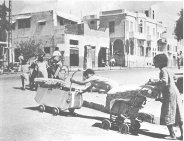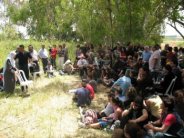‘Nakba law’ passes first legislation stage

On Tuesday 16 March the Knesset voted in favor of a law proposal to forbid public mourning activities in Israel on the anniversary of the establishment of the State of Israel.
The 14th of May, the date of the Israeli Declaration of Independence in 1948, is also the date marked by Palestinians as the “Nakba” or catastrophe, due to the displacement of hundreds of thousands of Palestinians from their homes before, during and after the 1948 war.
Israel marks its Independence Day on the Hebrew date, the 5th of Iyar.
The first reading of the law was passed with 15 votes for and 8 against, and second and third readings are still necessary for it to pass into law.
If approved, the law will forbid the public marking of Independence Day or of the establishment of the State of Israel as a day of mourning, and will “punish those who exploit the democratic and enlightened nature of the State of Israel in order to destroy it from within.”
Events marking the anniversary of the Nakba are organized annually by local councils of Arab towns and villages and by Arab party-linked groups, as well as by non-governmental organisations.
The law proposal, which replaces a previous even harsher text, is designed to target those bodies that receive a state budget. It imposes heavy fines on the organizers of such events and will cut governmental funding of official institutions, such as Arab local councils, that are responsible for them.
The same will apply to official institutions that are “responsible for activities that negate the existence of Israel as a Jewish and democratic state, incite to racism, violence and terrorism, or support armed struggle or terror against the state.”
Palestinian refugees and the internally displaced
Several million displaced Palestinians and their families are scattered in refugee camps and in other parts of the Occupied Palestinian Territory (OPT), Jordan, Lebanon and Syria, as well as in other countries around the world.
Some 4.7 million displaced Palestinians are recognized as refugees by the UN Relief and Works Agency (UNRWA). Many remain without civil status in the countries they live in.
Some Palestinians are defined as ‘internally displaced’ because they lost their homes and access to their villages but were allowed to remain within the State of Israel and enjoy Israeli citizenship.
According to Eitan Bronstein of Zochrot, an Israeli group dedicated to introducing the Palestinian narrative of the Nakba to Jewish-Israeli society, the custom of commemoration of the Nakba in Israel has its roots in Israeli military rule.
From 1948 to 1966, the Israeli government imposed military rule over those Palestinian communities that had remained inside Israel after the end of the war.
Palestinian citizens of Israel were not allowed to leave their towns without a permit from the Israeli military governor.
According to Bronstein, on Independence Day, that prohibition was lifted, and Palestinians used the occasion to visit their former homes. This practice became a custom, and remained so after the lifting of military rule and its restrictions in 1966, he said.
Over the years, says Bronstein, “this event took on a national-political aspect, and in recent years it is celebrated with a ‘march home’ to the remains of one of the localities captured during the Nakba. ‘Their independence; our Nakba,’ became the main slogan of these events.”

In recent years, a growing number of Jews have participated in the return marches to Palestinian localities captured by Israel during the 1948 war. The Nakba is also increasingly present in Israeli literature and film.
Israeli human rights groups have expressed anger and dismay at the law proposal, which they say would injure the freedom of expression of Israeli citizens, discriminate between Jews and Arabs, and further deepen the policies of segregation and exclusion directed at Palestinian citizens of Israel.
This article may be reproduced on condition that JNews is cited as its source
 This work is licensed under a Creative Commons Attribution-Noncommercial-Share Alike 3.0 Unported License.
This work is licensed under a Creative Commons Attribution-Noncommercial-Share Alike 3.0 Unported License.




